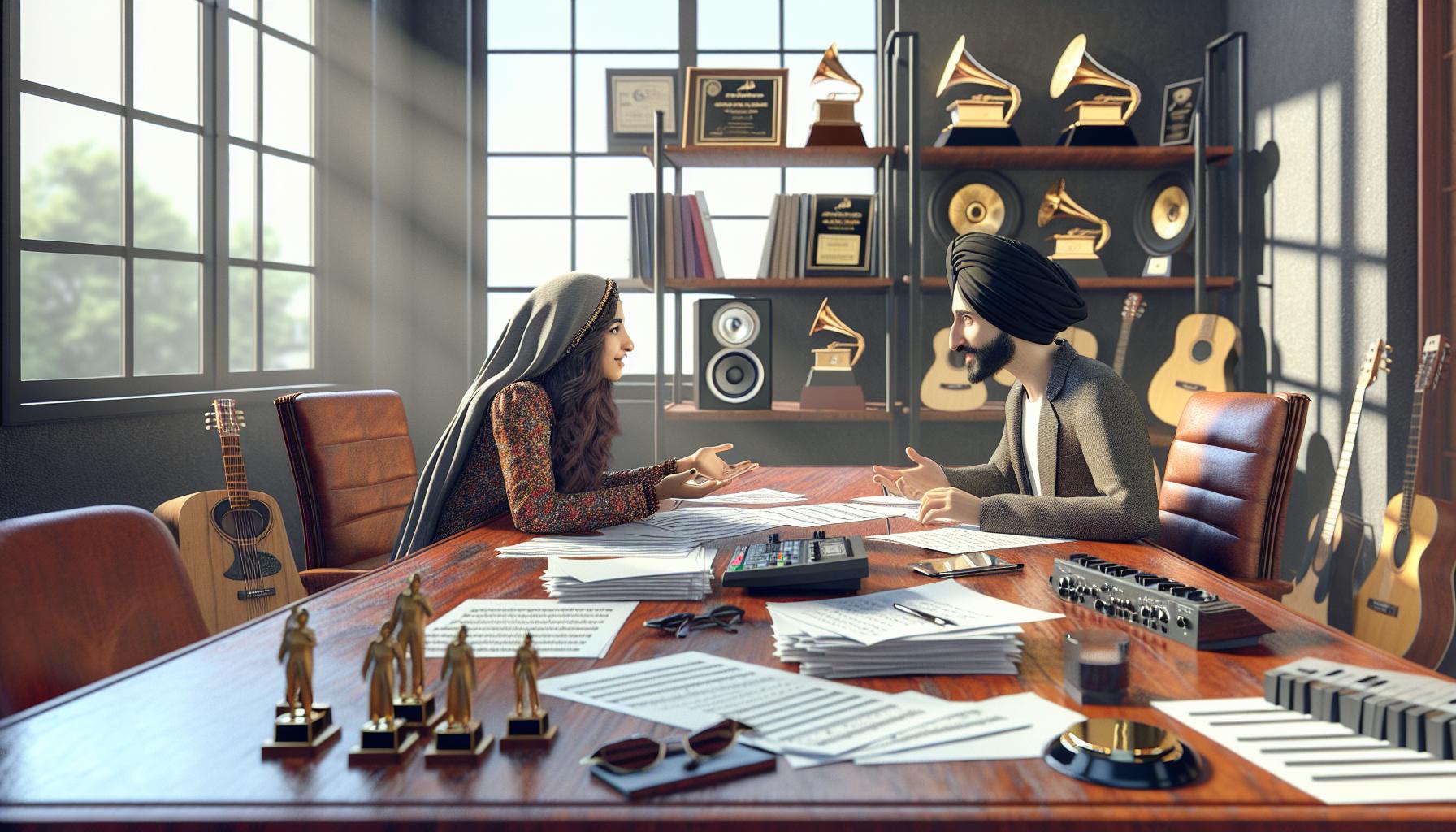If you’re a songwriter, I bet you’ve dreamed about hearing your songs on the radio or in your favorite TV show. But how do you get from creating a song in your bedroom to having it played worldwide? The answer is music publishing.
Music publishing can seem like a complex maze, but I’m here to guide you through it. With the right knowledge, you’ll be able to navigate the music industry and get your songs published.
Contents
What is Music Publishing?
In essence, music publishing centers on song ownership. This can sound like a complex legal piece but really, it’s about protecting the rights of the person or entity who owns a song’s copyright – usually the songwriter or their publisher.
To make things less abstract, let’s consider the song as a building. Suppose I create a building. As the architect (songwriter) I hold the copyright to my creation. But just as a building sits on a piece of land, a song plays on the ‘radio airwaves’ or a streaming platform.
In both cases, the ‘land’ or ‘airwaves’ don’t belong to me. So if I don’t retain a lifelong vigilance by camping out on my land (or next to the radio), I need someone who can wrestle the rights for me. That’s where the music publisher comes in.
With the digital age, the demand for securing these rights has risen worldwide. No longer are songwriters relegated to their hometowns, they can now reach out to billions of listeners across continents. As a songwriter, this ‘virtual ground’ promises a broader audience, but it also requires a stronger focus on protecting your rights.
Music publishers are experts in the business of music. They help songwriters to navigate through the complex world of music licensing, extending song reach and ensuring royalties flow in. In nutshell, they help the songwriter to turn their creations into income.
Understanding the Copyright Law
The copyright law underpins music publishing. This law upholds that any original work of music belongs to the songwriter the moment it gets documented – be it formally written or recorded. So even a voice-note on your phone suffices. Here’s where it gets really interesting – this copyright has two parts:
- The Master Rights: This belongs to the person who has the original recording of the song. This is often the songwriter or the record label if they financed the recording.
- The Publishing Rights: This belongs to the person who owns the actual composition of the song – the melody, chords, lyrics — it all belongs to the songwriter unless conveyed to someone else through a legal agreement.
Let’s not forget that music publishers don’t just defend copyright. They also actively work to increase a song’s usage, and therefore, its royalty income. They have teams that pitch songs to people in the entertainment industry, gather licensing fees, and collect due royalties.
Understanding the Role of a Music Publisher

Now that we’ve defined music publishing and discussed its importance, let’s delve deeper into the role of the music publisher. Essentially, a music publisher wears many hats in an artist’s career. They promote the song, license it, register copyright and collect royalties. All with a single goal – to increase an artist’s visibility and income. However, it’s not just about making money but about protecting the artist’s rights too.
1. Protecting the Rights:
When it comes to the rights of a song, a music publisher ensures they’re well-protected. There’s considerable effort required to enforce these rights, such as dealing with illegal downloads and unauthorized usage. As a songwriter or artist, you might not have the time or knowledge to tackle these issues. That’s where music publishers step in, doing the hard work for you.
2. Promoting the Music:
Next is the job of getting your music out there. Remember, it’s not just about creating fantastic songs but about ensuring they reach the right audience too. A critical role of the music publisher is to promote your music through advertisements, movies, video games and other platforms. They might also pair you up with other notable artists to widen your reach.
3. Royalties Collection:
It’s a well-known fact that music royalties can go uncollected if left unchecked. A music publisher makes sure this doesn’t happen. They are responsible for collecting royalties from the various parties who use your music. They’ll negotiate contracts, track where your music is played and ensure you’re paid fairly.
Let’s take a look at the percentage of royalties collected by music publishers worldwide:
| Region | Percentage |
|---|---|
| US | 27.3% |
| Europe | 34.2% |
| Asia | 20.5% |
| Rest of the world | 18% |
A music publisher’s role is complex and crucial in the music industry. They not only protect the artist’s rights and promote their work but also ensure they receive their well-deserved share of income from music usage. The value a music publisher brings to a musician’s life cannot be understated. It’s not just about the money; it’s about reaching your potential as an artist.
The Benefits of Music Publishing

As I delve further into the world of music publishing, it’s clear that it does more than just protect a musician’s rights. It also provides a slew of benefits that impact a musician’s career positively.
One of the greatest advantages a music publisher brings is expertise in maximizing royalty income. They’ve got the know-how to navigate the complex web of royalty streams and ensure the artist receives their fair share. According to the International Confederation of Authors and Composers Societies, music publishers worldwide collected a staggering $1.6 billion in digital royalties in 2017 alone.
| Year | Digital Royalties |
|---|---|
| 2017 | $1.6 billion |
In this digital age, a publisher stretches a song’s reach beyond traditional boundaries. They can make a song available in unexplored markets with their expansive network. Moreover, a good publisher would also pitch a songwriter’s music for commercials, films or TV shows, creating even more exposure and opportunities for additional income.
Last but not least, music publishers provide some much-needed administrative support. Composers often don’t have the time or expertise to manage royalty collections and copyright enforcement. A music publisher shoulders these responsibilities, freeing up the musician to focus solely on crafting great music.
When you consider all these benefits, it’s apparent how a music publisher can be an invaluable asset in the complex world of the music industry. It’s not just about monetizing your songs; it’s about carving out a sustainable, successful career in music. That’s the real value a music publisher brings to the table.
And when you think about it, isn’t that what every musician truly aims for?
Finding the Right Music Publisher for Your Songs

As the digital age keeps advancing, the demand for content protection, specifically music copyright protection, is skyrocketing. You’ve likely asked yourself, “Where do I fit in this complex industry filled with rights and royalties?” Well, a music publisher is your answer. But how do you find the right one?
When choosing a music publisher, consider their experience and reputation. Reputation is paramount in this industry. Established publishers have managed various issues, worked with diverse songwriters, and created beneficial connections across the industry, proving both their competence and network value.
You shouldn’t settle for anything less than a publisher with a strong track record of maximizing royalties for their songwriters. In the growing digital world, an effective music publisher must be skillful in navigating emerging platforms and consistently responsive to the shifting demands of the music landscape.
However, you shouldn’t just focus on their professional feats; consider their personal approach as well. It’s essential to ensure that a prospective publisher understands you, your goals, and your music. A good publisher will align with you on what constitutes as success and strive to make that a reality.
Lastly, it’s best to weigh the services each music publisher offers. Many publishers offer more than just licensing and royalty collections, such as –
- Marketing and promotion of your songs
- Registration of your music on different platforms
- Negotiation and management of sync licenses for television, film, or advertising placements
Choosing a music publisher is a significant decision in your music career. While these considerations are just starting points, they can guide you to make an informed decision that can lead to the growth and success of your music.
Next up, we’ll discuss the intricacies of music publishing agreements – something you’ll want to understand before signing on the dotted line…
Submitting Your Songs for Publishing
After you’ve pinpointed the ideal music publisher, the next crucial step is submitting your songs for publishing. Now, this process isn’t just about sharing your music files.
Initially, I’d advise you to prepare a structured portfolio or demo. It should contain your best work, be professionally recorded, and exhibit your unique style. The goal is to prove your worth and convince the publisher they should invest resources into promoting your music.
A couple of my tips to ace this process:
- Never submit unfinished work. Your song needs to be mixed and mastered.
- Typically, publishers will only listen to the first 30 to 90 seconds of a song. Your best material needs to be upfront.
- Include a variety of work in your demo if you have different genres or styles.
- Don’t overload your demo with songs. Three to five tracks is commonly recommended.
Creating a Cover Letter:
In addition to your demo, you’ll also need a well-drafted cover letter. This isn’t any regular job application, but the concept is the same. This is your chance to introduce yourself and establish an immediate connection with the publisher.
Your cover letter should adhere to these guidelines:
- Professional, concise, and error-free.
- Include relevant experiences, collaborations, or awards you’ve received.
- If you’ve had earlier songs published, certainly mention it.
- Express your interest in their publishing company specifically. Show you’ve done your homework.
Finally, remember, it’s all about persistence. You might face rejections, but don’t let that deter you. In this industry, continuous submissions and garnering connections are what will eventually pay off. In the following section, we’ll delve into the terms and conditions of music publishing agreements. Stay tuned.
The Contract and Licensing Process

After you’ve sent your polished demo to a publisher, you’ve set the right tone. Now, it’s time to dive into the maze of contracts and licensing. It’s here the legalities come into play and it’s absolutely vital to know your way.
Music Publishing Contracts are the legal agreements between the songwriter and the publisher. They entail specific clauses that dictate terms like royalty division, copyrights, and duration of agreement among others. A word to the wise here, do not casually sign on the dotted line without fully understanding the implications!
Licenses, on the other hand, are official permissions to release, broadcast, or reproduce your music. For example, one type of license known as the Mechanical License is issued by the songwriters or publishers to another party which allows them to reproduce and distribute the song.
There’s also the Performing Rights License which is issued by Performance Rights Organizations (PROs) to music-users (like radio stations and venues). Once this license is acquired, music-users can play any song in the repertoire of that PRO. Below is a small markdown table for a clearer understanding:
| Type of License | Issuer | Purpose |
|---|---|---|
| Mechanical License | Songwriters/Publishers | Reproduce and distribute the song |
| Performing Rights License | PROs | Play songs in the repertoire |
These contracts and licenses can look intimidating. But with professional help and a thorough understanding, they become assets to a songwriter. Remember, having control over your music is the foundation of a solid music career.
Protecting Your Rights as a Songwriter

Let’s talk about protecting your songwriter’s rights. This is a vital aspect of music publishing that can’t be overlooked.
See, when you write a song, you automatically own the rights to it. However, it’s crucial to formally protect these rights. Every songwriter’s nightmare is to have their work stolen or infringed upon, and a lack of proper legal protection can facilitate this disastrous scenario.
First, register your work with the Copyright Office in your country. It’s a tangible proof that the soundtrack is yours. Registration also helps to defend your rights in court should any legal issues arise. In the United States, this can be done through the U.S. Copyright Office.
Next, consider joining a Performing Rights Organization (PRO) such as ASCAP, BMI, or SESAC. These organizations track and collect performance royalties for songwriters and publishers. They also offer legal protection for songwriters, providing additional security for your music.
| Performing Rights Organization (PRO) | Countries of Operation |
|---|---|
| ASCAP | Internationally |
| BMI | USA and international affiliations |
| SESAC | USA and international affiliations |
Furthermore, familiarize yourself with fair use. This is a legal principle that allows others to use your copyrighted music under specific circumstances without requiring permission. Understanding fair use conditions can help prevent future misunderstandings and potential legal disputes.
Finally, remember to always keep good records of your work. This includes maintaining copies of your songs, lyrics, recordings, agreements, contracts, and any other relevant documents.
These simple steps won’t make you immune to all copyright issues, but they will give you a better defense if your music is ever misappropriated. So, don’t skip on setting up your protection—it’s fundamental to maintaining control over your music and ensuring a long, successful career in this industry. The next step in your music publishing journey? Let’s move on to identifying the right publisher for your music.
Promoting and Marketing Your Published Songs
Once you’ve managed to cross the hurdles of copyrighting and protecting your song rights, it’s time to delve into the sphere of promoting and marketing your published songs. Such undertakings demand just as much attention as, if not more than, the previous steps we’ve discussed.
First up in your marketing strategy, get familiar with social media platforms. In the age of digital music, I’ve found that a strong online presence is almost as valuable as the music itself. Social media not only bridges the gap between you and your audience, but it also offers an ocean of networking opportunities. Platforms like Instagram, Facebook, and Twitter, along with music-streaming apps like Spotify and Apple Music, are excellent starting points.
Next up is music videos. They are a potent tool for creative expression and garnering attention. A captivating music video can not only get your music across potential listeners but also feature on various music channels. And therein lies the potential for exposure on a grand scale.
Engaging a public relations agency could be another viable option. Such agencies have industry-specific contacts and can get your music played on radio stations, featured in magazines, or even land you a spot on a music festival.
Coordinating with music influencers and bloggers can likewise be productive. They play a vital role in shaping music trends and can help you achieve recognition in the overcrowded music market.
Here’s a breakdown of platforms, their intended outcomes, and the audiences the platforms reach:
| Platform | Intended Outcome | Audience |
|---|---|---|
| Brand Development | Global | |
| Audience Engagement | Global | |
| Spotify | Playback and Discovery | Global |
| Music videos | Broad-scale Exposure | Global |
| PR Agencies | Industry Exposure | Local and Global |
| Music Influencers/bloggers | Trend-setting/Music Discovery | Global |
Remember, no matter how stellar your music, it needs to be heard to make an impact.
Participation in songwriting competitions or performing live are additional proactive steps you can take. Such platforms usually have a wide reach and provide excellent exposure, connecting your music to people who matter most — the listeners.
Case Studies: Successful Songwriters and their Publishing Deals

Often, the best way to understand music publishing is from real-life scenarios. Learning from these cases, we gain much insight into the business side of music.
One prominent case involves the British hitmaker Ed Sheeran. After writing songs independently and facing various trials, he landed a publishing deal with Sony/ATV Music Publishing. At the time, Sheeran wasn’t yet a household name. He had, however, spent the time and effort to market his craft online and in live performances, which undoubtedly attracted Sony/ATV’s interest.
Under Sony/ATV, Sheeran’s music reached a global audience. Most of his songs topped international charts. His album ‘X’ went multi-platinum in several countries. Eventually, the partnership led to Sheeran co-writing songs for other big names in the industry, revealing how a publishing deal can open up other professional opportunities.
Another successful case features Grammy winner Alicia Keys. After honing her talents and sharing her work on various platforms, a representative from Columbia Records noticed her. Her signing with the company paved the way for her big break. Her album ‘Songs in A Minor’ was a major commercial success, proving the significant role of a music publisher in an artist’s career.
These case studies demonstrate how songwriters leveraged music publishing to share their talents with the world. They highlight the trials faced, the efforts made, and ultimately, the benefits of securing a beneficial publishing deal. It’s not only about getting your songs played. It’s also about those moments when you see others humming your melody or singing along during a concert. That’s the true power and magic of publishing.
Conclusion
So, you’ve learned the ins and outs of music publishing, and how vital it is to market your songs effectively. You’ve seen the power of social media, music-streaming apps, and music videos in amplifying your reach. You’ve understood the value of networking with influencers, bloggers, and engaging PR agencies. You’ve also grasped the potential benefits of participating in songwriting competitions and live performances. And remember, the journeys of successful songwriters like Ed Sheeran and Alicia Keys serve as inspiring examples. They’ve faced challenges, put in the work, and reaped the rewards of a favorable publishing deal. Now, it’s your turn. Armed with this knowledge, you’re ready to take your songs to the world. Here’s to your success in music publishing!
